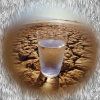Can You Live Without the Support of Aquatic Life?

Imagine the end of all marine life on the planet. With eyes clamped shut, allow the reasoning of the mind to paint a picture. This picture is important, for it is where people understand how completely dependent humans are on a stable ecology for their survival.
To preface the vision, each year in excess of 27,000 species of animal goes extinct, that averages out to more than three species per hour obliterated from any future on this planet. The term extinction means no surviving members of a species remains alive to procreate future generations and are nevermore inhabitants of Earth. The more species that die out of existence, the greater the significance becomes in managing an imbalanced ecosystem. Without the benefit of species diversification, these imbalances compound as the wildlife needed to take effective corrective measures no longer exists.
Aquatic life is of particular importance to sustain human life. Plankton life forms eat algae and without it, algae would uncontrollably grow into harmful algal blooms (HAB). These blooms would first poison the water and then effectively eradicate it. An excessive amount of plankton would not allow proper amounts of algae to grow. In order to balance plankton populations a healthy and widely diversified marine population of smaller fish and crustaceans needs to exist. Then, it is necessary to maintain a balance to the fish population to avoid them from becoming too prolific, subsequently killing off their food supply. To create this balance bigger fish and giant cetaceans are necessary. In order to control populations of big fish like sharks, and giant cetaceans like whales nature puts in place limited birth cycles, prolonged pregnancies, smaller numbers per birth, and the responsibility of each group to eat the young, sick, and dying for nourishment. Should one component in this aquatic chain face eradication the system collapses in on itself, which brings back the HAB problem.
More than 70 percent of the planet’s surface is water. However, under 1 percent of that water is available for human consumption. The United States Environmental Protection Agency (EPA) states that the percentage of freshwater remains constant because of evaporation. The Earth’s atmosphere evaporates saltwater and returns it to the planet purified. However, without the benefit of marine life, oceans would fill with HAB and turn freshwater resources toxic and undrinkable through the same process.
Approximately two thirds of the human body is comprised of water and without freshwater for regular consumption people would feel the effects of dehydration inside a week. Still, the problem seems to remain that people need a reason to care about aquatic life. Now that each has had the opportunity to close their eyes and envision a planet without marine life, open them and see what industries, governments, communities, and people are doing to contribute to that horrific image tucked neatly away behind eyelids.
For those interested, sign the Preserve Marine Life Initiative.
To preface the vision, each year in excess of 27,000 species of animal goes extinct, that averages out to more than three species per hour obliterated from any future on this planet. The term extinction means no surviving members of a species remains alive to procreate future generations and are nevermore inhabitants of Earth. The more species that die out of existence, the greater the significance becomes in managing an imbalanced ecosystem. Without the benefit of species diversification, these imbalances compound as the wildlife needed to take effective corrective measures no longer exists.
Aquatic life is of particular importance to sustain human life. Plankton life forms eat algae and without it, algae would uncontrollably grow into harmful algal blooms (HAB). These blooms would first poison the water and then effectively eradicate it. An excessive amount of plankton would not allow proper amounts of algae to grow. In order to balance plankton populations a healthy and widely diversified marine population of smaller fish and crustaceans needs to exist. Then, it is necessary to maintain a balance to the fish population to avoid them from becoming too prolific, subsequently killing off their food supply. To create this balance bigger fish and giant cetaceans are necessary. In order to control populations of big fish like sharks, and giant cetaceans like whales nature puts in place limited birth cycles, prolonged pregnancies, smaller numbers per birth, and the responsibility of each group to eat the young, sick, and dying for nourishment. Should one component in this aquatic chain face eradication the system collapses in on itself, which brings back the HAB problem.
More than 70 percent of the planet’s surface is water. However, under 1 percent of that water is available for human consumption. The United States Environmental Protection Agency (EPA) states that the percentage of freshwater remains constant because of evaporation. The Earth’s atmosphere evaporates saltwater and returns it to the planet purified. However, without the benefit of marine life, oceans would fill with HAB and turn freshwater resources toxic and undrinkable through the same process.
Approximately two thirds of the human body is comprised of water and without freshwater for regular consumption people would feel the effects of dehydration inside a week. Still, the problem seems to remain that people need a reason to care about aquatic life. Now that each has had the opportunity to close their eyes and envision a planet without marine life, open them and see what industries, governments, communities, and people are doing to contribute to that horrific image tucked neatly away behind eyelids.
- The oil industry spills billions of gallons of raw fossil fuel into the ocean that is expected to take hundreds of years to filter out. In addition, the chemicals used to “clean” these spills are toxic and change the components of healthy water. The oil industry’s solution is not to enforce stronger safety measures to prevent oil catastrophes, as one might suppose. Rather, this industry pays off politicians and expands drilling and pipeline schemes, as is evidenced with Shell drilling in the United States region of the Arctic Circle, Exxon drilling unrestrained throughout the Russian sector of the Arctic, and Canada with its most atrocious extraction of Tar Sands, to make up for lost product.
- Uncontrolled overfishing is a problem due to inadequate fishing restrictions and the lack of enforcement for those in place. Fish bred in fish farms generate a deadly parasite that spreads to the natural fish population. Unwanted fishnets, made from non-biodegradable materials, are cut loose rather than reeled in causing marine life to become entangled and drown.
- There are five garbage islands containing more than 200 billion pounds (90,800,000 metric tons) of rubbish crushing out aquatic life. Yet, there are those who do not change their shopping habits.
- The use of active sonar by oil drilling platforms and submarines has been linked to the beached whale phenomenon. The number of cetacean deaths from the unnecessary use of sonar became so alarming that the United States Navy went on record to alert nations of its impact.
- Lobbyists encouraging the United States government to forgo the merits of the Clean Water Act, Clean Air Act, Endangered Species Act, Environmental Policy Act, and numerous international treaties to encourage the generation of tailing ponds to dispose of toxic wastes. Even without a full breach the waste seeps into groundwater, killing animals and making people sick, as is evidenced by the Tar Sands tailing ponds that leaks toxic material into the freshwater Athabasca River at a rate of 17.7 gallons (67 liters) per second.
For those interested, sign the Preserve Marine Life Initiative.
You Should Also Read:
Animal Deaths are Rubbish
Clean Water for Healthy Animals
Fossil Fuels Affect Core Aquatic Life

Related Articles
Editor's Picks Articles
Top Ten Articles
Previous Features
Site Map
Follow @WildlifeWelfare
Tweet
Content copyright © 2023 by Deb Duxbury. All rights reserved.
This content was written by Deb Duxbury. If you wish to use this content in any manner, you need written permission. Contact Deb Duxbury for details.







